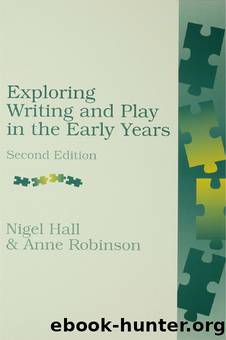Exploring Writing and Play in the Early Years by Hall Nigel;Robinson Anne;

Author:Hall, Nigel;Robinson, Anne;
Language: eng
Format: epub
ISBN: 668624
Publisher: Taylor & Francis Group
The interrelationship between play and literacy
What might it mean for a school to create situations which reflected ideological as well as autonomous literacy practices?
⢠What if sometimes the children were not distanced from real-world purposes for literacy, if language was not distanced by being used solely for analytic purposes, and if literacy experiences derived from a complex social situation rather than from the ritualistic performance demands of school literacy tasks?
⢠What if sometimes narratives were not privileged and the genres used derived from the social need, if texts were problematic and raised issues that confronted childrenâs beliefs about the world and their roles and rights, and if children were treated as knowers and doers rather than as ignorant and passive?
⢠What if sometimes the childrenâs work was not assessed, if situations explored transcended the artificial barriers of school and classroom walls, and if children were not even conscious that they were learning about literacy?
⢠What if sometimes children could really care about situations and felt they could act towards them in a literate way?
We believe that in early years education the response to the above questions has to be a positive one, and the mechanism for achieving this is the relationship between literacy and socio-dramatic play. What is it about socio-dramatic play and how children use it in school that makes it so appropriate for this task? Very simply, as the evidence of chapters 2 and 3 makes clear, it shares many of the underlying characteristics of ideological literacy.
Socio-dramatic play is fully meaningful and enjoyable to children and is usually initiated by them. It often draws on childrenâs real-world experiences and knowledge. The meanings of play are not historically and politically determined by the institutions of schooling but relate to concerns of the lives of people as lived outside schooling. As Paley (1988: 6) said, âImages of good and evil, birth and death, parent and child, move in and out of the real and the pretend. There is no small talk. The listener is submerged in philosophical position papers, a virtual recapitulation of lifeâs enigmas.â
Within socio-dramatic play a huge range of topics occur, and those topics draw on a wide range of sources and involve a range of roles. The demand upon players is not a constant but will vary according to role, situation and event.
In this type of play, children initiate events and as co-players respond to other peopleâs initiations. Play is often structured in events, thus the elements of the play are grounded in the events; these elements are not played for their own sake â they are means to ends. Within these events, the action is coherent and the success of play is not measured by performance in the elements but by the satisfaction of the players about the whole event.
Many aspects of play within events can be related to literacy, and this literacy is a means to an end: not experienced for its own sake. Play is not assessed and children are free to explore what
Download
This site does not store any files on its server. We only index and link to content provided by other sites. Please contact the content providers to delete copyright contents if any and email us, we'll remove relevant links or contents immediately.
The Art of Coaching Workbook by Elena Aguilar(50149)
Trainspotting by Irvine Welsh(21062)
Twilight of the Idols With the Antichrist and Ecce Homo by Friedrich Nietzsche(18314)
Fangirl by Rainbow Rowell(8811)
Periodization Training for Sports by Tudor Bompa(7939)
Change Your Questions, Change Your Life by Marilee Adams(7396)
This Is How You Lose Her by Junot Diaz(6466)
Asking the Right Questions: A Guide to Critical Thinking by M. Neil Browne & Stuart M. Keeley(5377)
Grit by Angela Duckworth(5314)
Red Sparrow by Jason Matthews(5215)
Paper Towns by Green John(4817)
Room 212 by Kate Stewart(4750)
Ken Follett - World without end by Ken Follett(4459)
The Sports Rules Book by Human Kinetics(4089)
Housekeeping by Marilynne Robinson(4077)
Double Down (Diary of a Wimpy Kid Book 11) by Jeff Kinney(3945)
Papillon (English) by Henri Charrière(3933)
The Motorcycle Diaries by Ernesto Che Guevara(3798)
Exercise Technique Manual for Resistance Training by National Strength & Conditioning Association(3793)
